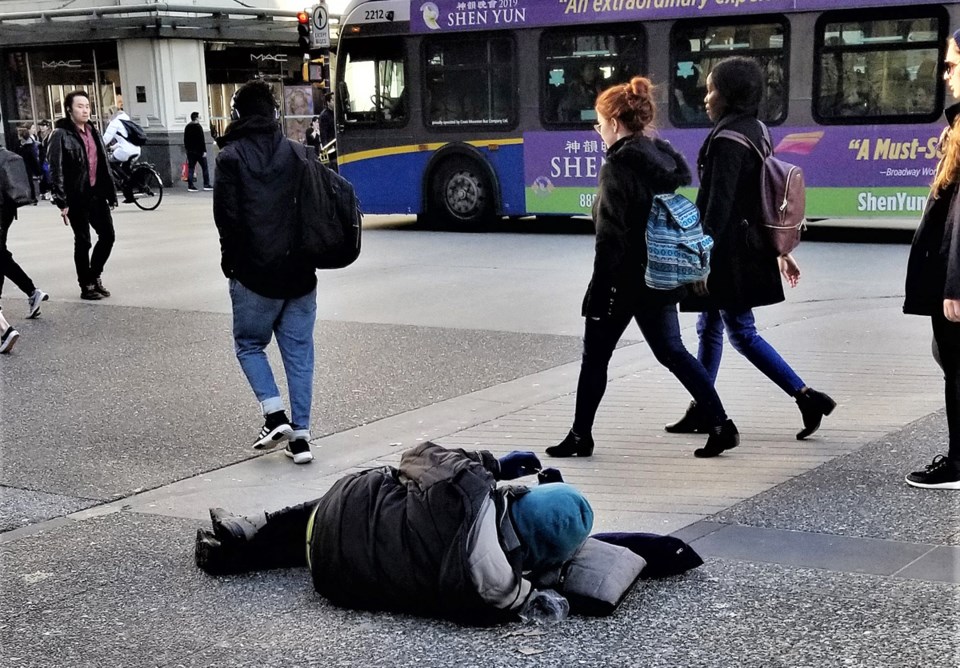I would like to begin this week’s column by thanking the many Courier readers who contacted me following my last column on the need for more public toilets in Vancouver.
Thanks also to CKNW’s Lynda Steele and Jill Bennett who invited me and their listeners to discuss the topic.
The catalyst for this week’s column was what I saw leaving the CKNW studio at Granville and Georgia streets. Lying in the middle of the sidewalk was a man either asleep or trying to sleep while pedestrians walked around him.
Outside the nearby Bay store was another man in a sleeping bag. Beside him was a shopping cart full of clothing and plastic bags while other pieces of clothing and bags were scattered around.
Along the Granville Mall, more men were camping on the sidewalk. Some were in sleeping bags, while others had created small structures with cardboard and wood. I should add that the mall is not just becoming their bedroom — it’s their toilet too, evident to anyone walking past.
I felt very sorry for these men who are likely suffering from mental and physical challenges and experiencing very difficult lives.
However, I was also upset by the level of tolerance or lack of concern exhibited by the people walking by and a city administration and police department that allows people to camp on downtown sidewalks day after day.
Ten years ago this month, I unveiled a proposal based on my 1971 university architectural thesis to set up relocatable modular structures on vacant land to house the homeless and others seeking affordable housing.
I regularly promoted the concept and was pleased when it eventually resulted in the modular housing program now underway in Metro Vancouver and around the province.
Four years ago, as we awaited a B.C. Supreme Court decision on whether it was illegal for homeless people to camp in public places, I wrote that perhaps the homeless should be pitching tents outside the BC Legislature and city halls to bring more attention to their plight.
Since then, we have witnessed numerous battles as the homeless, often encouraged by housing activists, have set up tent camps in Victoria, Maple Ridge, Surrey and elsewhere.
While we await the results of this year’s homeless count, it might be worth reviewing what is happening in Seattle. Earlier this year, I posted on my blog a provocative article by documentary filmmaker Christopher Rufo.
Rufo reported that a record numbers of homeless people are occupying his city’s public spaces despite massive government spending to fight the problem.
In 2017, King County counted 11,643 people sleeping in tents, cars and emergency shelters. Property crime is significantly higher than in Los Angeles and New York and cleanup crews pick up tens of thousands of dirty needles from city streets and parks every year.
Rufo noted that “at the same time, Metro Seattle spends $1 billion fighting homelessness every year. That’s nearly $100,000 for every homeless man, woman and child in King County, yet the crisis seems only to have deepened.”
Interestingly, he referenced academic studies in San Francisco and Vancouver that concluded that up to half the homeless in these cities moved from elsewhere, for their permissive culture and generous services. He believes the same holds true for his city.
Rufo writes that the situation in Seattle is a textbook example of what sociologists call pathological altruism, or “altruism in which attempts to promote the welfare of others instead results in unanticipated harm.” He maintains the city’s “compassion campaign” has devolved into permissiveness, enablement, crime, and disorder.
While our politicians call for more money to build more temporary modular housing, we also need a much more comprehensive approach to addressing homelessness, including more addiction treatment programs and employment programs like EMBERS Eastside Works.
We need to offer more family reunification programs and personal grooming and dental care for those seeking it.
We should also fund initiatives like KIDCARE Canada, which was founded by my sister to prevent another generation of individuals from becoming homeless.
In future columns, I will review what other cities are doing to address homelessness. In the meanwhile, I think we should stop people from camping at Granville and Georgia and other major downtown intersections.
@michaelgeller
geller@sfu.ca



